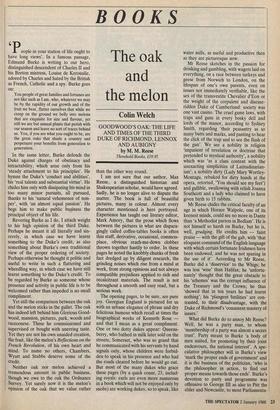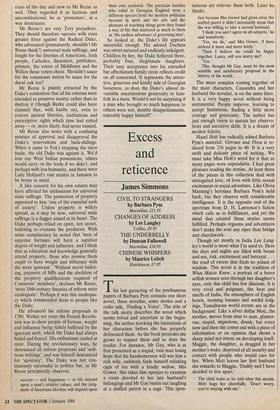BOOKS
The oak and the melon
Colin Welch
GOODWOOD'S OAK: THE LIFE AND TIMES OF THE THIRD DUKE OF RICHMOND, LENNOX AND AUBIGNY by M. M. Reese
Threshold Books, £19.95
People in your station of life ought to have long views'. In a famous passage, Edmund Burke is writing to our hero, distinguished descendent of Charles II and his Breton mistress, Louise de Keroualle, adored by Charles and hated by the British as French, Catholic and a spy. Burke goes on:
You people of great families and fortunes are not like such as I am, who, whatever we may be by the rapidity of our growth and of the fruit we bear, flatter ourselves that while we creep on the ground we belly into melons that are exquisite for size and flavour, yet still we are but annual plants that perish with our season and leave no sort of traces behind us. You, if you are what you ought to be, are the great oaks that shade a country and perpetuate your benefits from generation to generation.
In the same letter, Burke defends the Duke against charges of obstinacy and intractability, which arise only from his `steady attachment to his principles'. He hymns the Duke's 'conduct and abilities', his 'real talents and substantial virtue'. He chides him only with dissipating his mind in too many minor pursuits, all pursued, thanks to his 'natural vehemence of tem- per', with 'an almost equal passion'. He begs him to make public business the principal object of his life.
Revering Burke as I do, I attach weight to his high opinion of the third Duke. Perhaps he meant it all literally and sin- cerely, in which case we have learnt something to the Duke's credit, as also something about Burke's own traditional view of the proper ordering of society. Perhaps otherwise he thought it politic and useful to write in such a flattering and wheedling way, in which case we have still learnt something to the Duke's credit. To be regarded by Burke as someone whose presence and activity in public life is to be welcomed rather than impeded is no small compliment.
Yet still the comparison between the oak and the melon sticks in the gullet. The oak has indeed left behind him Glorious Good- wood, mansion, pictures, park, woods and racecourse. These he commissioned and supervised or bought with unerring taste.
Yet they are not his own unaided creation, the fruit, like the melon's Reflections on the French Revolution, of his own heart and mind. To name no others, Chambers, Wyatt and Stubbs deserve some of the credit.
Neither oak nor melon achieved a tremendous amount in public business, though we owe to the oak the Ordnance Survey. Yet surely now it is the melon's opinion of the oak that we value rather than the other way round.
I am not sure that our author, Max Reese, a distinguished historian and Shakespearian scholar, would have agreed. Sadly, he is no longer alive to dispute the matter. The book is full of beautiful pictures, many in colour. Almost every character mentioned is here portrayed. Experience has taught our literary editor, Mark Amory, that the prose which flows between the pictures in what are dispara- gingly called coffee-tables books is often thin stuff, derivative, occasional, common- place, obvious reach-me-down clobber thrown together hastily to order. In these pages he noted the knobbly chunks of fresh fact dredged up by diligent research, the grinding noises which rise from a mind at work, from strong opinions and not always compatible prejudices applied to rich and recalcitrant materials. The result is not throughout a smooth and easy read, but a serious work.
The opening pages, to be sure, are pure joy. Georgian England is pictured for us with an urbane elegance of phrase and dry felicitous humour which recall at times the biographical works of Kenneth Rose and that I mean as a great compliment. One or two dotty dukes appear: Queens- berry, who bathed in milk later sold on the streets; Somerset, who was so grand that he communicated with his servants by hand signals only, whose children were forbid- den to speak in his presence and who had the roads cleared before he would go out. But most of the many dukes who grace these pages (by a quick count, 23, includ- ing royals: earls are even more numerous in a book which will not be enjoyed only by snobs) are working dukes, so to speak, like water mills, as useful and productive then as they are picturesque now.
Mr Reese sketches in the passion for drinking and gambling, with wagers laid on everything, on a race between turkeys and geese from Norwich to London, on the lifespan of one's own parents, even on issues not immediately verifiable, like the sex of the transvestite Chevalier d'Eon or the weight of the corpulent and disease- ridden Duke of Cumberland: society was one vast casino. The cruel game laws, with traps and guns in every bosky dell and lords of the manor, according to Sydney Smith, regarding 'their peasantry as so many butts and marks, and panting to hear the click of the trap and to see the flash of the gun'. We see a nobility in religion `impatient of revelation or doctrine that pretended to mystical authority', a nobility which was 'as a class content with the unexacting simplicities of Latitudinarian- ism'; a nobility dirty (Lady Mary Wortley- Montagu, rebuked for dirty hands at the opera, retorted, 'You should see my feet') and gullible, swallowing with relish Joanna Southcott and a lady who claimed to have given birth to 15 rabbits.
Mr Reese chides the critical faculty of an age in which Horace Walpole, one of its keenest minds, could see no more in Dante than 'a Methodist parson in Bedlam'. He is not himself so harsh on Burke, but he is, well, grudging. He credits him — faint praise — with the gift of the gab, with 'that eloquent command of the English language with which certain fortunate Irishmen have been endowed, and he was not sparing in the use of it'. According to Mr Reese, Burke did a 'disservice' to the Whigs; he was less 'wise' than Halifax; he 'unfortu- nately' thought that the great obstacle to his 'schemes' was the corrupt influence of the Treasury and the Crown; he thus `showed that in ten years he had learnt nothing'; his 'plangent futilities' are con- trasted, to their disadvantage, with the Duke of Richmond's 'consistent mastery of issues.'
What did Burke do to annoy Mr Reese? Well, he was a party man, to whom `membership of a party was almost a secret trust'. Party meant to Burke 'a body of men united, for promoting by their joint endeavours, the national interest'. A spe- culative philosopher will in Burke's view `mark the proper ends of government' and it is the business of the politician, 'who is the philosopher in action, to find out proper means towards those ends'. Burke's devotion to party and programme was offensive to George III as also to Pitt the elder and Newcastle, to most Parliamenta- rians of the day and now to Mr Reese as well. They regarded it as factious and unconstitutional, he as 'premature', in a way doctrinaire.
Mr Reese's are very Tory prejudices. They should therefore operate with even greater force against the Radical Duke, who advocated (prematurely, shouldn't Mr Reese think?) universal male suffrage, and fought for the liberties of Americans, Irish people, Catholics, dissenters, publishers, printers, the voters of Middlesex and the Wilkes those voters chose. Shouldn't sauce for the commoner melon be sauce for the ducal oak too?
Mr Reese is plainly attracted by the Duke's contention that all his reforms were intended to preserve society rather than to destroy it (though Burke could also have claimed that, with knobs on), even to restore ancient liberties, institutions and prescriptive rights which time had rotted away — or, more likely, had never existed.
Mr Reese also notes with a confusing mixture of approval and disapproval the Duke's reservations and back-slidings. When it came to Fox's stopping the slave trade, the old Duke was against it. We'd lose our West Indian possessions, others would carry on the trade if we didn't, and perhaps with less humanity, and there were Lady Holland's vast estates in Jamaica to be borne in mind.
A like concern for his own estates may have affected his enthusiasm for universal male suffrage. The protection of property appeared to him 'one of the essential ends of society'. Unless property is widely spread, as it may be now, universal male suffrage is a dagger aimed at its heart. The Duke perhaps relied on open, not secret, balloting to overawe the predators. With some complacency he noted that 'men of superior fortunes will have a superior degree of weight and influence, and I think that as education and knowledge generally attend property, those who possess them ought to have weight and influence with the more ignorant'. 'Without secret ballot- ing, payment of MPs and the abolition of the property qualifications required of Commons' members', declares Mr Reese, 'most 18th-century theories of reform were inadequate'. Perhaps it was this inadequa- cy which commended them to people like the Duke.
He advanced his reform proposals in 1780. Within ten years the French Revolu- tion was to show people of fortune, weight and influence being rudely buffeted by the ignorant mob, which the Duke had always hated and feared. His enthusiasm cooled at once. During the revolutionary wars, he denounced all reform proposals and 'sedi- tious writings', and was himself denounced for 'apostasy'. The Duke was not con- tinuously successful in politics but, as Mr Reese percipiently observes,
success — and happiness — in life depend upon a man's relative values; and the judg- ment of historians likewise will depend upon their own yardstick. The patrician families who ruled in Georgian England were a different species from the modern politician because in sport and the arts and the pleasure of watching things grow they found a way of life that mattered as much to them as 'the endless adventure of governing men'.
So looked at, the Duke's life appears successful enough. His adored Duchess was sweet-natured and endlessly indulgent. Childless by her, the Duke fathered three, probably four, illegitimate daughters. Their easy acceptance into his extended but affectionate family circle reflects credit on all concerned. It represents the attrac- tive, generous and kindly side of Georgian looseness, as does the Duke's almost in- variable uncensorious generosity to kins- folk in a mess. Would it not be surprising if a man who brought so much happiness to others were not, despite disappointments, tolerably happy himself?











































 Previous page
Previous page